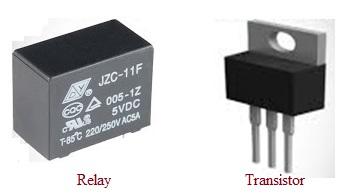Relay vs. Transistor: Key Differences Explained
Advertisement
This article explores the differences between relays and transistors, two fundamental components used in electronic circuits.
What is a Relay?
- A relay is an electromechanical switch. It controls a circuit by opening and closing contacts, allowing it to operate other devices within the same or different electric circuits.
- Relays are typically used in circuits with lower ampere capacities, usually up to a maximum of 20A.
- They are generally smaller in size compared to other switching devices like contactors.
- Relays usually have at least two contacts, which can be either Normally Open (NO) or Normally Closed (NC).
- Relays find applications in control circuits, automation systems, protection mechanisms, and various switching circuits.

What is a Transistor?
- Transistors come in two main types: NPN and PNP. They can function as both amplifiers and switches within a circuit.
- A transistor has three terminals: Base, Emitter, and Collector.
- When used as a switch, a transistor operates in two modes: cut-off and saturation.
- In cut-off mode, the transistor acts like an open switch, blocking current flow.
- In saturation mode, it acts like a closed switch, allowing current to flow freely.
- For an NPN transistor:
- Applying a negative DC bias voltage to the base puts it in cut-off mode.
- Applying a positive voltage to the base puts it in saturation mode.
- Refer to application notes for more information on using a Transistor as a switch.
Relay vs. Transistor: A Detailed Comparison
The following table highlights the key differences between relays and transistors:
| Specifications | Relay | Transistor |
|---|---|---|
| Power supply | Can work with both AC and DC. | Can work with DC only. |
| Power loss | Has zero closed resistance. | Has forward voltage drop, leading to power wastage. |
| Resistance | Infinite open resistance. | Has leakage current, which can affect connected electronic circuits. |
| Temperature | Can operate at extreme temperatures. | Operates up to approximately 95°C and slightly below 0°C. |
| Speed of operation | Much slower, operating at around 200 Hz. | Can operate at MHz speeds. |
| Damaged by | Primarily damaged by overcurrent. | Damaged by voltage spikes, overcurrent, etc. |
| Isolation | Very high isolation from the control coil. | Not isolated from the Base, Gate, or Trigger. |
| Wear out | Shorter mechanical wear-out contact life. | Transistor switches almost never wear out. |
| Application | Can only be used to open and close circuits. | Can amplify analog signals as well as function as a switch. |
Advertisement
 RF
RF




